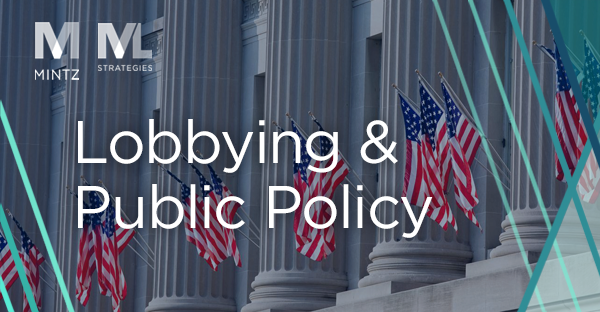
Life Sciences
Viewpoints
Filter by:
FDA in Flux — July 2025 Newsletter
July 9, 2025 | Article | By Joanne Hawana, Benjamin Zegarelli
The July 2025 edition of FDA in Flux highlights five significant developments shaping the regulatory landscape for medical, life sciences, and consumer product sectors.
FDA in Flux — June 2025 Newsletter
June 12, 2025 | Article | By Joanne Hawana, Benjamin Zegarelli
Welcome to FDA in Flux – A Mintz newsletter tracking rapid changes in policy and agency actions that impact medical, life sciences, and consumer product investment decisions and development strategies.
Between the Biotech Waves Conversation with William Hicks
April 16, 2025 | Podcast
Life Science Dealmaking Trends 2025
January 8, 2025 | Video | By Cheryl V. Reicin
Employers and company owners should stay informed of the 2025 life science dealmaking trends. In a series of videos, International Chair of Life Sciences Cheryl Reicin provides valuable commentary on Big Pharma M&A, deal drivers, patent cliff impacts, and emerging sectors.
The Life Sci Fantastic Podcast - The Business of Biotech
November 28, 2024 | Podcast
Why companies may want to accelerate marketing approval for their patented drugs in Canada
November 8, 2024 | Blog | By Lee Johnson, PhD, Christine C. Pemberton, PhD
New Schedule 13G Accelerated Filing Deadlines Effective Today, September 30, 2024
September 30, 2024 | Alert | By Page R. Hubben, Daniel T. Kajunski, Anne Bruno
Read about the new accelerated filing deadlines for ownership reporting on Schedule 13G that take effect on September 30, 2024 and the requirements for different types of investors.
New Biden Executive Order Emphasizes Women’s Health
March 27, 2024 | Alert | By Pamela Mejia, Anthony DeMaio
On March 18, President Biden signed an executive order (EO) that contributes to the administration’s objective to create solutions to long-lasting women’s health issues that have been historically understudied and under-evaluated.
FDA Needs a New Approach to AI/ML-Enabled Medical Devices
March 12, 2024 | Blog | By Benjamin Zegarelli
We have been writing about software as a medical device (SaMD) for years, tracking the Food and Drug Administration's (FDA) efforts to keep up with the fast-paced development of digital technology, such as launching the Digital Health Center of Excellence, implementing predetermined change control plans, and issuing various digital health guidances on device software functions, clinical decision support software, cybersecurity, and other topics. In anticipation of FDA’s Artificial Intelligence /Machine Learning (AI/ML) Medical Devices Workshop in October 2021, we posted a brief history of the agency’s regulatory oversight of software through the traditional medical device regulatory framework established in the 1970s, in which we highlighted the numerous challenges associated with such an approach. But now, with the rise of artificial intelligence and machine learning and the proliferation of AI/ML-enabled software throughout the health care industry, FDA is facing enormous challenges using an outdated, procrustean regulatory framework to maintain standards of safety and quality for such software devices. It is becoming increasingly clear that innovation in the AI/ML and digital health technology space is advancing rapidly, as FDA Commissioner Rob Califf has emphasized in many recent public appearances, and that the traditional device framework is quickly becoming unworkable for such technologies.
ARPA-H Commits $100 Million to Accelerate Women’s Health Research through Sprint for Women’s Health
February 28, 2024 | Alert | By Pamela Mejia, Sarah C. Palmer, Anthony DeMaio
Read about Sprint for Women’s Health, a first-of-its-kind initiative to commit $100 million for research and development in women’s health, announced by the Advanced Research Projects Agency for Health.
Frequently Asked Questions for Private Companies Considering a Reverse Merger
February 13, 2024 | Article | By William Hicks, John T. Rudy
Reverse mergers aren’t an alternative to an IPO, rather they can be a strategic approach for companies looking to go public by leveraging “fallen angels”. Mintz Members Bill Hicks and John Rudy answer frequently asked questions for private companies considering a reverse merger in an article featured in PitchBook’s 2023 Annual US VC Valuations Report. The authors detail the benefits and challenges associated with a reverse merger including finding partners, PIPE financing, Nasdaq access for non-US companies, and SEC implications.
Deal Activity Takeaways from JPM 2024
January 19, 2024 | Blog | By William Whelan
Top 5 Takeaways from JPM 2024
January 12, 2024 | Blog | By Cheryl V. Reicin
J.P. Morgan Healthcare Conference (JPM) is one of the industry’s most important life science investment conferences of the year. Learn more about Cheryl Reicin's top five takeaways from the event.
State AGs Demand Action on Pulse Oximeter Inaccuracy as FDA's Efforts Lag
November 14, 2023 | Blog | By Benjamin Zegarelli
A new battle is emerging in the fight for health equity, and it’s centered on the humble pulse oximeter. On November 1, 2023, 25 state attorneys general sent a letter to the Food and Drug Administration (FDA) demanding that the agency take urgent action to address pulse oximeter inaccuracies that continue to create health care risks for people of color. The letter comes exactly one year after a public meeting held by the Anesthesiology and Respiratory Therapy Devices Panel of the FDA’s Medical Devices Advisory Committee titled “Pulse Oximeter Accuracy and Limitations,” and nearly 21 months after the agency issued a safety communication about pulse oximeter inaccuracies when used on people with dark skin pigmentation (see our previous blog post on pulse oximeter performance here).
Things to Consider When Determining the Regulatory Requirements for Software (Hint: It’s More Than the Device Classification)
October 4, 2023 | Blog | By Benjamin Zegarelli
The capabilities and sophistication of digital health technologies are constantly expanding, especially with the integration of artificial intelligence and machine learning. Many companies, both existing and start-up, are developing software aimed at health care systems, hospitals, physicians, and lay-users for various levels of use, from assisting diagnoses in a clinical environment to tracking exercise and general health indicators in the home. In particular, a growing number of companies is focusing on the development of digital therapeutics - a class of software devices that deliver and monitor medical interventions for the purpose of treating, managing, or preventing certain diseases or conditions - for use in a patient’s home. With all of the new players jumping into the digital health technology game, we thought it might be useful to provide a brief primer on certain factors to consider when evaluating the potential regulatory requirements for such products.
CMS Announces Drug List for Inflation Reduction Act Price Negotiations
August 29, 2023 | Alert | By Theresa Carnegie, Lauren Moldawer
The Centers for Medicare & Medicaid Services recently released the first 10 drugs included in the Inflation Reduction Act’s Medicare Drug Price Negotiation Program. Mintz Member Theresa Carnegie and Of Counsel Lauren Moldawer discuss the program, implications for drug manufacturers, and early lawsuits brought by drugmakers.
Can Enablement and Written Description Bars be Lower for Method-Of-Treatment Patent Claims?
August 21, 2023 | Blog | By Lei Xu, PhD, Dean Farmer, PhD, Christina Sperry
Patent offices may reject a patent application with claims reciting using a composition to treat a disease, based on the requirement that the claimed treatment is not fully supported by the application.
Distinguishing Patent Protection from Patient Safety – A Role for the FDA
August 21, 2023 | Blog | By Peter Hecker, PhD, Lee Johnson, PhD
At its heart, a patent grants the right to stop another person from doing whatever falls within the scope of the patent’s claims. A patent is not a right to practice what is included in the patent, or a government stamp of approval on everything within the scope of its claims.
Five Ways To Target Success As A Startup
July 11, 2023 | Article
Turning innovation into a successful business can be daunting. In a panel discussion at the BIO International Convention, Mintz’s Josh Fox, who is a Member in our Chambers-ranked Life Sciences practice, alongside Massachusetts Institute of Technology (MIT) professors Robert Langer, Angela Koehler, and Giovanni Traverso, examined the challenges associated with spinning out innovations from academic and research institutions, including how to build a team to run a new company and how to fund startups, particularly those that may not attract traditional venture capital easily (or at all). Here are their five key takeaways.
FDA Opens a Pilot Program to Scrutinize Certain Laboratory Developed Tests, But Will It Generate Sufficient Interest?
June 28, 2023 | Blog | By Benjamin Zegarelli
The U.S. Food and Drug Administration (FDA) announced a new pilot program on June 21, 2023 that gives sponsors of oncology products the opportunity to submit validation and performance data for laboratory developed tests (LDTs) intended to support patient selection for such drugs. Although the pilot is limited to only nine participants, it is unclear based on the requirements of the program whether it will generate sufficient interest among oncology product sponsors to meet the objectives that the agency has established for it.
Explore Other Viewpoints:
- Data Centers & Digital Infrastructure
- AI: The Washington Report
- Antitrust
- Appellate
- Arbitration, Mediation & Alternate Dispute Resolution
- Artificial Intelligence
- Awards
- Bankruptcy & Restructuring
- California Land Use
- Cannabis
- Class Action
- Complex Commercial Litigation
- Construction
- Consumer Product Safety
- Corporate Governance (ESG)
- Cross-Border Asset Recovery
- DEI Legal Developments
- Debt Financing
- Direct Investing (M&A)
- Diversity
- EB-5 Financing
- Education & Nonprofits
- Employment
- EnforceMintz
- Environmental (ESG)
- Environmental Enforcement Defense
- Environmental Law
- Environmental, Social, and Corporate Governance (ESG)
- FDA Regulatory
- False Claims Act
- Federal Circuit Appeals
- Financial Institution Litigation
- Government Law
- Growth Equity
- Health Care
- Health Care Compliance, Fraud and Abuse, & Regulatory Counseling
- Health Care Enforcement & Investigations
- Health Care Transactions
- Health Information Privacy & Security
- IP Due Diligence
- IPRs & Other Post Grant Proceedings
- Immigration
- Impacts of a New US Administration
- Insolvency & Creditor Rights Litigation
- Institutional Investor Class Action Recovery
- Insurance & Financial Services
- Insurance Consulting & Risk Management
- Insurance and Reinsurance Problem-Solving & Dispute Resolution
- Intellectual Property
- Investment Funds
- Israel
- Licensing & Technology Transactions
- Life Sciences
- Litigation & Investigations
- M&A Litigation
- ML Strategies
- Medicare, Medicaid and Commercial Coverage & Reimbursement
- Mergers & Acquisitions
- Patent Litigation
- Patent Prosecution & Strategic Counseling
- Pharmacy Benefits and PBM Contracting
- Portfolio Companies
- Privacy & Cybersecurity
- Private Client
- Private Equity
- Pro Bono
- Probate & Fiduciary Litigation
- Products Liability & Complex Tort
- Projects & Infrastructure
- Public Finance
- Real Estate Litigation
- Real Estate Transactions
- Real Estate, Construction & Infrastructure
- Retail & Consumer Products
- Securities & Capital Markets
- Securities Litigation
- Social (ESG)
- Special Purpose Acquisition Company (SPACs)
- Sports & Entertainment
- State Attorneys General
- Strategic IP Monetization & Licensing
- Sustainable Energy & Infrastructure
- Tax
- Technology
- Technology, Communications & Media
- Technology, Communications & Media Litigation
- Trade Secrets
- Trademark & Copyright
- Trademark Litigation
- Unified Patent Court (UPC)
- Value-Based Care
- Venture Capital & Emerging Companies
- White Collar Defense & Government Investigations
- Women's Health and Technology







